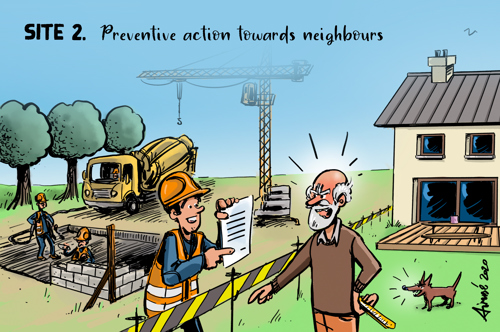- Construction Law , Real Estate, Renting and Co-ownership
- neighbour nuisance , preventive claim , preventive claim towards neighbours , neighbour , claim for preventive measures
On this site, you will learn from Victoria that, as a result of the new property law, it will be possible to bring a claim for preventive measures in order to inhibit excessive neighbour nuisance.
1. What does "neighbour nuisance" mean?
Despite being a common problem, and even in case of building works, neighbour nuisance has so far not been explicitly regulated.
Since article 544 of the Civil Code contains a definition of "property law", it has always served as basis for claims with regard to neighbour nuisance.
However, the new Property Law provides for an autonomous development of the theory of neighbour nuisance. This new theory takes into account the existing definitions of "neighbour nuisance " as provided by case law and legal doctrine.

The new law provides explicitly that neighbouring owners have a right of use and enjoyment of their property. Neighbours must exercise their right of use and enjoyment with balance, by not imposing a nuisance on the neighbour that exceeds the normal inconveniences of the neighbourhood and which are attributable to the neighbour.
As in the past, no fault will be required in order for there to be nuisance neighbour.
The new property law has also defined the criteria to qualify the excessive nature of the nuisance. During this assessment, all particular circumstances of the case will be taken into account, such as the time, frequency and intensity of the nuisance, the first occupation or the public use of the property at the origin of the nuisance .
2. The claim for preventive measures
With the new property law it will be possible to bring a preventive action to inhibit excessive neighbour nuisance.
If the property causes serious and manifest risks to the safety, health or pollution with respect to a neighbouring property, disturbing the balance both properties, the owner or user of the neighbouring property will be able to require the application of preventive measures in court. The aim of this preventive measures would be to inhibit the effective realisation of these risks.
Even though the scope of these preventive measures has not been defined by the legislator, you should take into account that they can be far reaching, such as e.g. suspension of the works, adaptation of the construction project, extra protective measures.

3. How will your construction project be impacted?
With the preventive claim, it will be possible to require the implementation of measures even before nuisance and damage have occurred.
This is an important evolution as, at this moment, it is usually required to demonstrate the nuisance and resulting damage prior to the introduction of a claim.
For construction projects in particular, this means that a neighbour can have the works halted or even hamper the start of the works before any nuisance or damage has occurred. Within this same context, it will also be possible to require the implementation of additional protective measures in order to prevent potential nuisance.
Not only the preventive claims themselves, but also their dispute in court may cause delays to construction projects. Preventive measures may also result in additional construction costs, for example when additional protective measures need to be taken.
It is advised to take this into account when drawing up your contracts, e.g. when determining the delivery date and the delay penalties, but also when determining the price.
In order to amend your contracts in accordance with this new legislation, you can always contact the Seeds of Law Team (+32 (0)2 747 40 07 or via info@seeds.law). If you are confronted with a preventive claim in the future, you can also contact our specialists to assist you in this matter.
False Read alsoDiscover our e-book about the new property law
In our e-book "Together on a roadtrip through the new property law" you will discover a number of important topics about the new property law.








